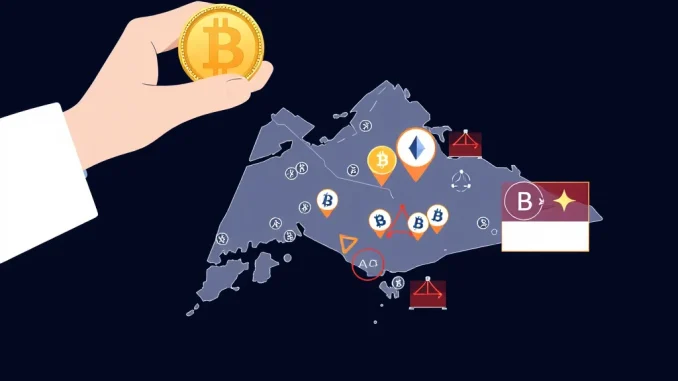
Singapore has cemented its position as a major hub for cryptocurrency and blockchain innovation. However, with growth comes the need for clear rules. A significant development in Singapore crypto regulation has just been announced, sending a clear signal to firms operating in the space.
What Did Singapore’s MAS Announce About Unlicensed Crypto Services?
The Monetary Authority of Singapore (MAS), the nation’s central bank and financial regulator, has made a crucial announcement regarding local crypto firms. The core of the new rule is straightforward but impactful: any digital token service provider (DTSP) based in Singapore that does not hold the necessary MAS crypto license must stop providing services to clients located overseas.
Here are the key details:
- Who is affected? Local firms offering digital token services without a DTSP license from MAS.
- What must they stop? Serving clients located outside of Singapore.
- When is the deadline? June 30, 2025.
- Is there a grace period? No, MAS explicitly stated there will be no grace period.
- What are the consequences? Non-compliant firms may face penalties.
This information was reported by Wu Blockchain, citing the MAS announcement.
Why Is MAS Implementing This Singapore Crypto Regulation?
Singapore’s approach to regulating the crypto sector has been evolving. While aiming to foster innovation, MAS also prioritizes maintaining financial stability and protecting consumers from risks like money laundering and terrorist financing. This new rule appears to be another step in ensuring that only licensed entities, subject to MAS’s oversight and compliance standards, are permitted to offer services, particularly those that extend beyond Singapore’s borders.
By requiring firms serving overseas clients to be licensed, MAS can potentially exercise greater control over cross-border transactions originating from Singapore-based entities, enhancing overall crypto compliance efforts within its jurisdiction and internationally.
How Does This Impact Crypto Firms Singapore?
This announcement has direct implications for numerous Crypto firms Singapore. Firms that have been operating under regulatory exemptions or that have focused on international clientele without obtaining the full DTSP license now face a hard deadline. They must either cease their overseas operations or successfully obtain the required license before June 30, 2025.
For firms seeking to continue serving overseas clients, the path forward involves navigating the MAS licensing process. This typically requires demonstrating robust compliance frameworks, risk management systems, and financial stability. The process can be rigorous and time-consuming.
Firms that choose not to pursue a license or fail to obtain one in time will need to carefully wind down their overseas service provision by the deadline to avoid potential penalties from MAS. This involves significant operational and potentially legal considerations.
Understanding the MAS Crypto License (DTSP)
The Digital Token Service Provider (DTSP) license falls under Singapore’s Payment Services Act (PSA). Obtaining this license is a comprehensive process that requires firms to meet stringent requirements related to:
- Anti-Money Laundering (AML) and Counter-Terrorist Financing (CTF) measures
- Cybersecurity and technology risk management
- Safeguarding customer assets
- Governance and internal controls
- Capital and financial requirements
The new rule emphasizes that even if a firm’s primary operations or clientele were previously considered outside the direct scope requiring a full license under certain interpretations, serving *any* overseas client from Singapore now necessitates this formal licensing if they provide digital token services.
What Should Unlicensed Crypto Firms Singapore Do Now?
For affected firms, inaction is not an option given the clear deadline and lack of a grace period. Key steps include:
- Assess Current Operations: Identify which overseas clients or services fall under the new restriction.
- Evaluate Licensing Viability: Determine if pursuing the MAS crypto license is feasible and aligns with the business strategy.
- Plan for Transition: If seeking a license, begin the application process immediately. If not, develop a clear plan to cease providing unlicensed crypto services to overseas clients by the deadline.
- Seek Expert Advice: Consult with legal and compliance professionals experienced in Singapore’s crypto regulations.
- Communicate: Prepare to inform affected overseas clients about the changes.
The June 30, 2025 deadline may seem distant, but the licensing process and the operational changes required to comply are substantial.
Conclusion: A Step Towards Stricter Crypto Compliance
MAS’s announcement marks a significant tightening of the regulatory perimeter for Crypto firms Singapore. By mandating that only licensed entities can serve overseas clients, Singapore reinforces its commitment to a well-regulated crypto ecosystem. This move aims to mitigate risks associated with cross-border transactions involving unlicensed crypto services originating from within its borders. Firms operating without the necessary MAS crypto license must act decisively to ensure compliance with this critical new Singapore crypto regulation by the June 2025 deadline or face potential penalties. This development underscores the global trend towards increased regulatory scrutiny in the digital asset space.



